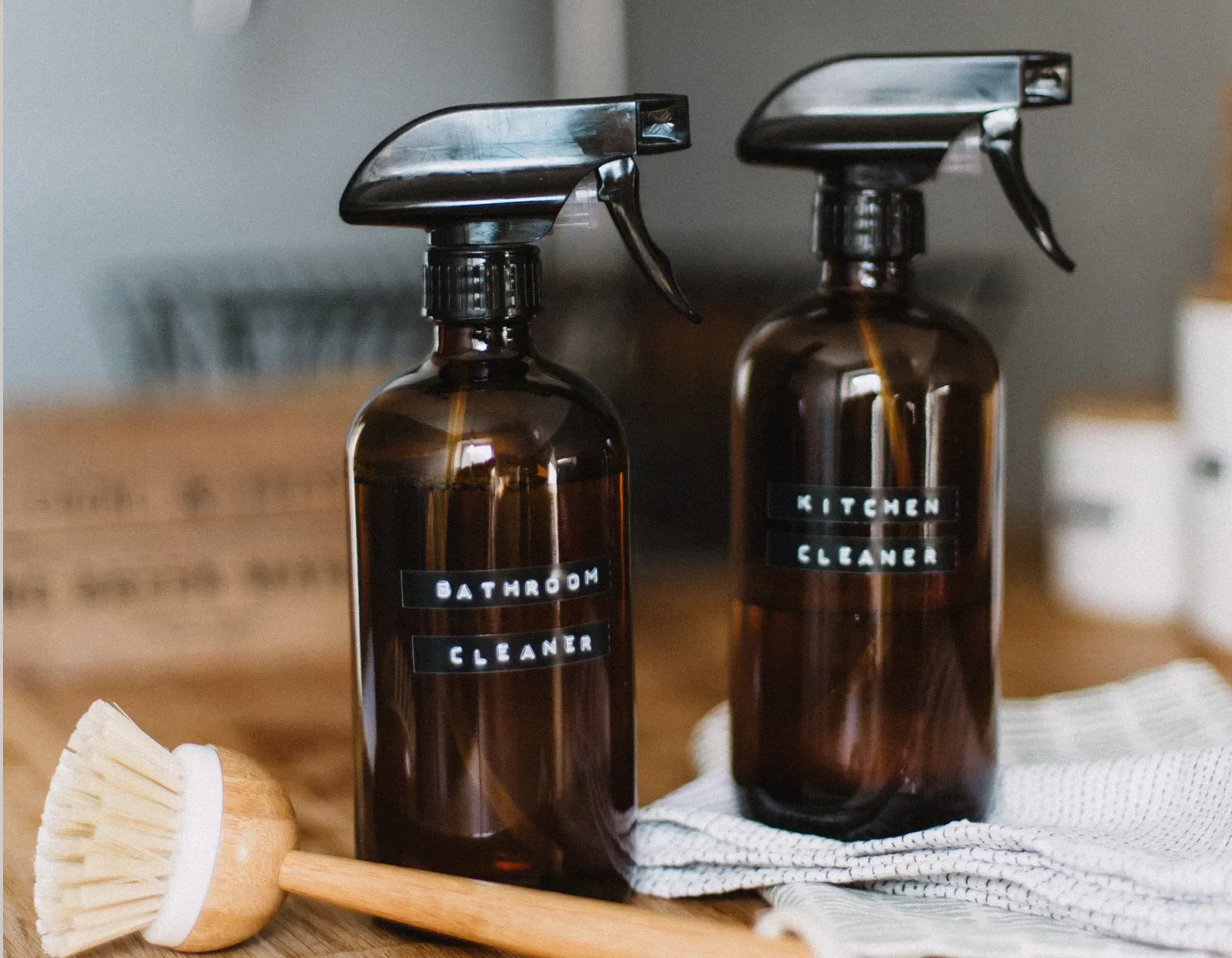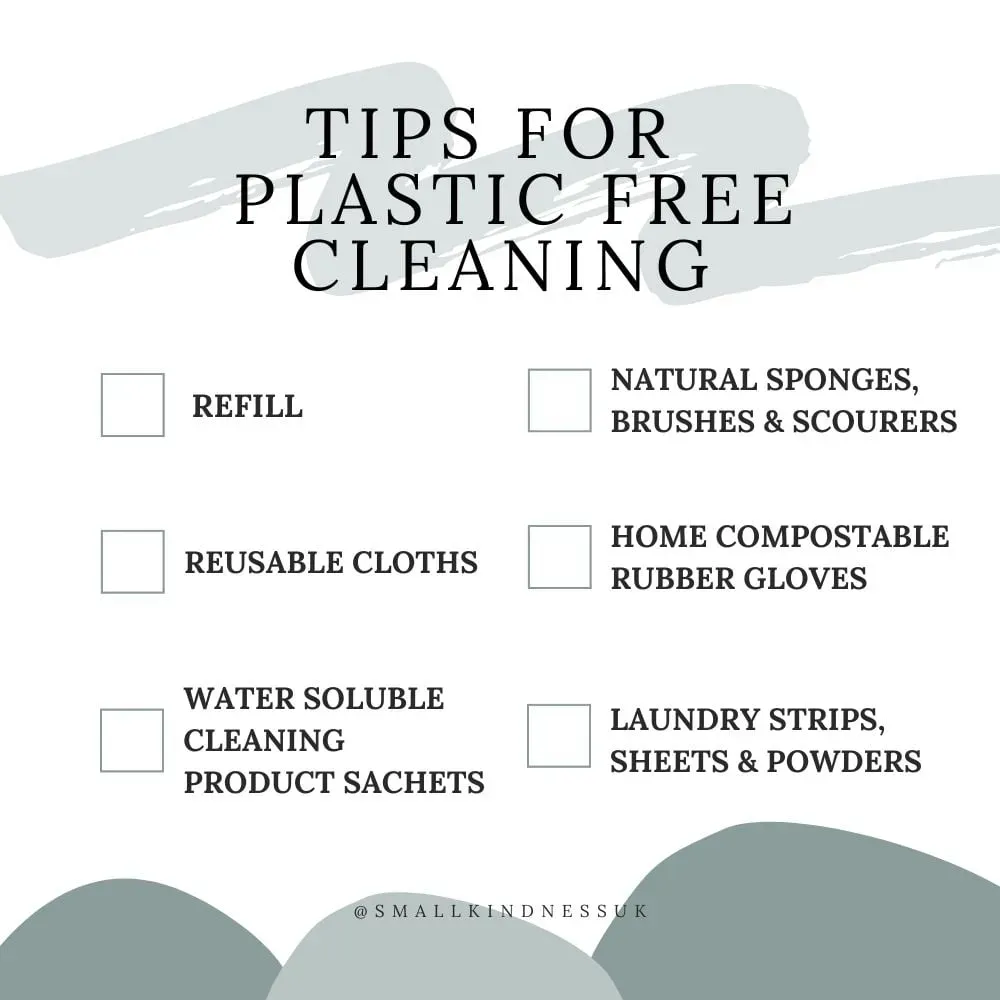How to clean your house plastic free
Here are some tips and ideas to help keep your home spick and span without loads of plastic waste.

As we continue with plastic free July I thought I would tackle another area in our homes that generates a lot of plastic waste and that is cleaning. Here I share how you can limit single use plastic when it comes to cleaning products. I appreciate there is a lot here but don't get overwhelmed - remember small changes make a big difference. Every time you finish using something - see if there is a plastic free alternative and maybe give it a go - you do not need to swap everything in one go - that is not a sustainable solution. Be kind to yourself, go one swap at a time and find what works for you and your family

Most of the swaps mentioned below can be bought from Zero waste shops either in person or online. If you don't know where to start a great online store that has a wide range of products is Peace with the Wild.
Refill
I am super lucky as I have a zero waste shop with in walking distance (the wonderful Clean Kilo) so I refill my washing up liquid, laundry liquid, laundry conditioner and toilet cleaner. You can also refill all kinds of household cleaners too although I choose to use soluble sachets (more on that later). I appreciate that not everyone is as lucky as I am.
However, there are other options including Milk and More who as well as delivering you milk in glass bottles are also now delivering refillable cleaning and laundry products in glass, which when finished you leave out for the milkman to collect!. Also some zero waste shops do delivery and even supermarkets are starting to have refill stations for some products too.
Dish Washing
If refill is not available, another option for washing up is using dishwashing soap. I have recently made and used my own washing up soap (and stain sticks). I did it as I was thinking about adding it as a product to the shop but unfortunately the UK detergent regulations are prohibitively expensive for a small business like mine. However, I thought I could share how to make them for those of you who would be interested in giving that a go! To make sure you don’t miss this when I publish it I would recommend signing up for my newsletter.
If using soap to wash up with is a step too far (it is super easy I promise) there are a few other options including dish washing powder and paste.
And if you have a dishwasher there are a number of options for plastic free dishwashing tablets - a number of which are plant based too.
Rubber gloves
Standard rubber gloves often come in a plastic bag but you can buy gloves that are plastic free and made from natural rubber which means they can be home composted once they have reached the end of their useful life.
Laundry
Again if refill is not an option there are a number of companies that make washing strips/sheets which you just place in washing machine drum. These are often plant based, biodegradable and palm oil free.
You could of course go old school and choose the option of washing powder as in general that will come in a cardboard box.
If you are looking for a completely natural option you could try soap nuts (sometimes called soapberries). These are the dried fruit shells of the Sapindus Mukorossi tree, which is native of the Himalayas. They have naturally high levels of saponins (a natural detergent) and can be used directly in the drum of your washing machine to wash your clothes. The soap nuts can be used multiple times and once they reach the end of their life they can be put on your compost at home. The soap nuts that I have are organic, wildcrafted and shipped using well a ship to keep the carbon footprint as low as possible.
Another important factor to consider when it comes to laundry are microplastics. These tiny pieces of plastic shed from synthetic clothes during the washing process and they then can directly enter our waterways. One way to prevent this is to wash your synthetic clothes in a Guppy bag, which captures the microplastics and prevents them from entering the waterways. Some washing machine manufacturers are starting to add microplastic filters to their machines or you can buy a filter that you can attach yourself to your current washing machine from Planet Care.
Cleaning cloths/ sponges/ scourers/ brushes
The cleaning sponges and green and yellow scrubbies that we have all used for years are usually made from polyurethane - a form of plastic that unfortunately takes centuries to breakdown. Thankfully there is now lots of choice for cleaning cloths and scourers that are made from natural materials that are fully biodegradable and many are home compostable. You can find cloths and scourers made from coconut, cotton, bamboo and jute. For brushes look for natural bristles - like those made of sisal - as these are fully biodegradable. Be wary of anything that just says "vegan bristles" without any further details as these will probably be nylon and therefore plastic. And moving away from plastic clothes and scourers doesn't have to cost anything - an old toothbrush is great for scrubbing and old t shirts/towels make good cloths too. And an old sock makes a great duster!!
Kitchen Roll
We use bamboo kitchen roll that is not wrapped in plastic which we get delivered alongside our toilet roll from Who Gives a Crap. There is also the option of using reusable paper towels (which you can buy or make from old towels/tea towels/towels/t Shirts). Using reusable kitchen roll is something that I am hoping to move over to - although I don't think it will entirely replace the bamboo kitchen roll as for certain things (usually involving the cat) I prefer to use something I can throw away!!
Cleaning products
There are a number of companies that sell really nifty water soluble sachets for your cleaning products. The benefit of this is they are plastic free and you are not paying for something that is predominantly water to be shipped. I have been using Ocean Saver - that are made from naturally derived ingredients, palm oil free and sustainably sourced. I use their bathroom, kitchen and anti-bacterial cleaning sachets. You just pop the sachet in a bottle and fill with warm water, shake and they are ready to use. You can purchase lovely glass bottles to put them in, but personally I prefer to use the plastic ones I already have as that is ensuring the single use plastic is constantly reused.
If you have found this post useful and don't want to miss out on the other articles I will be sharing throughout plastic free July with tips, tricks and ideas as to how you can reduce your plastic waste, please join my newsletter.
...
I am Kelly Townsend and this is the Small Kindness Blog. I am a scientist, a bee lover, a rewilding obsessive, and I want to spread Small Kindnesses through the medium of soap. Follow me on Facebook, Instagram and Twitter for your daily dose of kindness, sustainability and (of course) soap making
